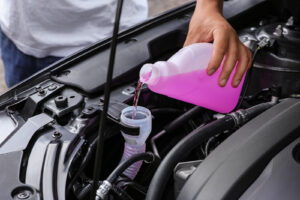“Ensure a smooth and safe winter driving experience by checking your vehicle’s fluid levels before the cold weather hits. Don’t risk getting stranded on the side of the road due to low fluids. Visit buyfromnorm.ca to stock up on high-quality fluids for your vehicle today.”
The Importance of Regularly Checking Vehicle Fluid Levels Before Winter
Winter is just around the corner, and with it comes colder temperatures, icy roads, and harsh weather conditions. As a car owner, it is important to prepare your vehicle for the winter season to ensure its optimal performance and your safety on the road. One crucial aspect of winter car maintenance is checking the vehicle fluid levels. In this article, we will discuss why it is important to regularly check your vehicle fluid levels before winter.
First and foremost, checking your vehicle fluid levels before winter can prevent potential breakdowns and costly repairs. As the temperature drops, the fluids in your car can thicken, making it harder for them to flow smoothly. This can put a strain on your engine and other components, leading to malfunctions and breakdowns. By checking and topping up your fluids, you can ensure that your car is running smoothly and avoid any unexpected breakdowns on the road.
Another reason to check your vehicle fluid levels before winter is to maintain your car’s performance. Each fluid in your car has a specific function, and if they are not at the proper levels, it can affect your car’s performance. For example, low engine oil can cause friction and damage to your engine, while low coolant can lead to overheating. By regularly checking and topping up your fluids, you can ensure that your car is performing at its best, even in the harsh winter conditions.
Moreover, checking your vehicle fluid levels before winter can also improve your car’s fuel efficiency. When your car’s fluids are at the proper levels, it can run more efficiently, resulting in better fuel economy. This is especially important during the winter when your car needs to work harder to overcome the cold temperatures and icy roads. By maintaining your car’s fluids, you can save money on gas and reduce your carbon footprint.
In addition to preventing breakdowns and maintaining performance, checking your vehicle fluid levels before winter is also crucial for your safety on the road. As mentioned earlier, low engine oil and coolant levels can lead to engine damage and overheating, which can be dangerous while driving. Low brake fluid levels can also affect your car’s braking system, making it less effective in stopping your car. By regularly checking and topping up your fluids, you can ensure that your car is in top condition and reduce the risk of accidents on the road.
Furthermore, checking your vehicle fluid levels before winter can also extend the lifespan of your car. As the saying goes, prevention is better than cure. By regularly maintaining your car’s fluids, you can prevent any potential damage or wear and tear on your car’s components. This can save you money in the long run by avoiding costly repairs or replacements.
Lastly, checking your vehicle fluid levels before winter is a simple and easy task that can be done by anyone. You don’t need to be a car expert to check your car’s fluids. Most modern cars have easily accessible fluid reservoirs with clear markings for the proper levels. You can also refer to your car’s manual for instructions on how to check and top up your fluids. By taking a few minutes to check your car’s fluids, you can ensure your safety and the optimal performance of your vehicle during the winter season.
In conclusion, checking your vehicle fluid levels before winter is crucial for preventing breakdowns, maintaining performance, improving fuel efficiency, ensuring safety, and extending the lifespan of your car. It is a simple and easy task that can save you money and keep you safe on the road. So, before the winter season arrives, make sure to check your car’s fluids and top them up if needed. Your car and your wallet will thank you.
How to Winterize Your Vehicle’s Fluids for Optimal Performance in Cold Weather

Winter is just around the corner, and with it comes colder temperatures, icy roads, and harsh weather conditions. As a car owner, it is important to take the necessary steps to prepare your vehicle for the winter season. One crucial aspect of winterizing your car is checking and maintaining the fluid levels. In this article, we will discuss why it is important to check vehicle fluid levels before winter and how to properly winterize your vehicle’s fluids for optimal performance in cold weather.
First and foremost, it is important to understand the role of fluids in your vehicle. Your car’s fluids are responsible for lubricating, cooling, and protecting various components of the engine and other systems. In cold weather, these fluids can become thicker and less effective, which can lead to potential problems and even breakdowns. This is why it is crucial to check and maintain the fluid levels in your vehicle before winter arrives.
One of the most important fluids to check is the engine oil. The oil in your car’s engine is responsible for lubricating the moving parts and preventing them from grinding against each other. In cold weather, the oil can become thicker, making it harder for the engine to start and causing unnecessary strain on the components. It is recommended to check the oil level and quality before winter and change it if necessary. Additionally, consider using a winter-grade oil that is specifically designed for colder temperatures.
Another vital fluid to check is the coolant or antifreeze. This fluid is responsible for regulating the temperature of the engine and preventing it from freezing in cold weather. If the coolant level is low, it can lead to overheating or even freezing of the engine, which can cause significant damage. It is important to check the coolant level and top it off if needed. You can also have the coolant system flushed and refilled with fresh antifreeze to ensure optimal performance in the winter.
In addition to the engine oil and coolant, it is important to check other fluids such as transmission fluid, brake fluid, power steering fluid, and windshield washer fluid. These fluids also play a crucial role in the proper functioning of your vehicle and can be affected by cold weather. Make sure to check the levels and top them off if needed. It is also a good idea to have these fluids flushed and replaced if they are old or contaminated.
Aside from checking the fluid levels, it is also important to inspect the condition of the fluids. For example, if the engine oil appears dark and dirty, it may be time for an oil change. Similarly, if the coolant is discolored or contains debris, it may need to be flushed and replaced. It is always better to be proactive and address any potential issues before they become bigger problems.
In addition to checking and maintaining the fluid levels, there are a few other steps you can take to winterize your vehicle’s fluids. One is to use a fuel additive to prevent the fuel from freezing in cold temperatures. Another is to use a de-icer additive in your windshield washer fluid to prevent it from freezing on your windshield. You can also consider using a synthetic oil that is designed for colder temperatures.
In conclusion, checking and maintaining the fluid levels in your vehicle before winter is crucial for optimal performance and to prevent potential problems. Make sure to check the engine oil, coolant, and other fluids, and address any issues before they become bigger problems. By taking these steps, you can ensure that your vehicle is ready to handle the harsh winter weather and keep you safe on the road.
The Dangers of Neglecting Vehicle Fluids During the Winter Months
Winter is a beautiful season, with snow-covered landscapes and cozy nights by the fire. However, it also brings harsh weather conditions that can take a toll on our vehicles. As the temperature drops, it is crucial to ensure that our vehicles are prepared for the winter months. One essential aspect of winter vehicle maintenance is checking and maintaining the fluid levels. Neglecting vehicle fluids during the winter months can lead to various dangers, from decreased performance to potential accidents.
One of the most critical fluids to check before winter is the engine oil. Engine oil is responsible for lubricating the engine’s moving parts, reducing friction and preventing wear and tear. During the winter, the cold temperatures can cause the oil to thicken, making it difficult for the engine to start. This can put a strain on the battery and starter, leading to potential breakdowns. Additionally, thick oil can also decrease fuel efficiency and cause damage to the engine over time. Therefore, it is crucial to check the oil level and viscosity before the winter season to ensure smooth engine performance.
Another vital fluid to check is the coolant or antifreeze. As the name suggests, this fluid prevents the engine from freezing in cold temperatures. It also helps regulate the engine’s temperature, preventing it from overheating. During the winter, the coolant should have a higher concentration of antifreeze to prevent freezing. If the coolant level is low or the concentration is not adequate, it can lead to engine overheating, which can cause severe damage and potentially leave you stranded on the side of the road. Therefore, it is essential to check the coolant level and concentration before the winter season to avoid any potential dangers.
Brake fluid is another crucial fluid that should not be neglected during the winter months. It is responsible for transferring the force from the brake pedal to the brakes, allowing you to stop your vehicle safely. As the temperature drops, brake fluid can absorb moisture, which can lead to decreased braking performance. This can be especially dangerous during the winter when roads are slippery and require more braking power. Therefore, it is crucial to check the brake fluid level and condition before the winter season to ensure your brakes are working correctly.
Windshield washer fluid is often overlooked, but it is just as important as other vehicle fluids during the winter. It is responsible for keeping your windshield clean and clear, providing you with a clear view of the road. During the winter, roads are often covered in salt, dirt, and snow, which can quickly accumulate on your windshield. If your washer fluid level is low, you may not be able to clean your windshield properly, hindering your visibility and potentially causing accidents. Therefore, it is crucial to check and refill the washer fluid before the winter season.
In addition to these essential fluids, it is also crucial to check other fluids such as power steering fluid, transmission fluid, and differential fluid. These fluids play a vital role in the proper functioning of your vehicle and should not be neglected during the winter months. It is also essential to check for any leaks or signs of wear and tear in the hoses and belts that carry these fluids.
In conclusion, neglecting vehicle fluids during the winter months can lead to various dangers, from decreased performance to potential accidents. Therefore, it is crucial to check and maintain the fluid levels before the winter season to ensure your vehicle is prepared for the harsh weather conditions. Regularly checking and topping up these fluids can not only prevent potential dangers but also prolong the life of your vehicle. So, before you hit the road this winter, make sure to give your vehicle the necessary TLC it needs.




